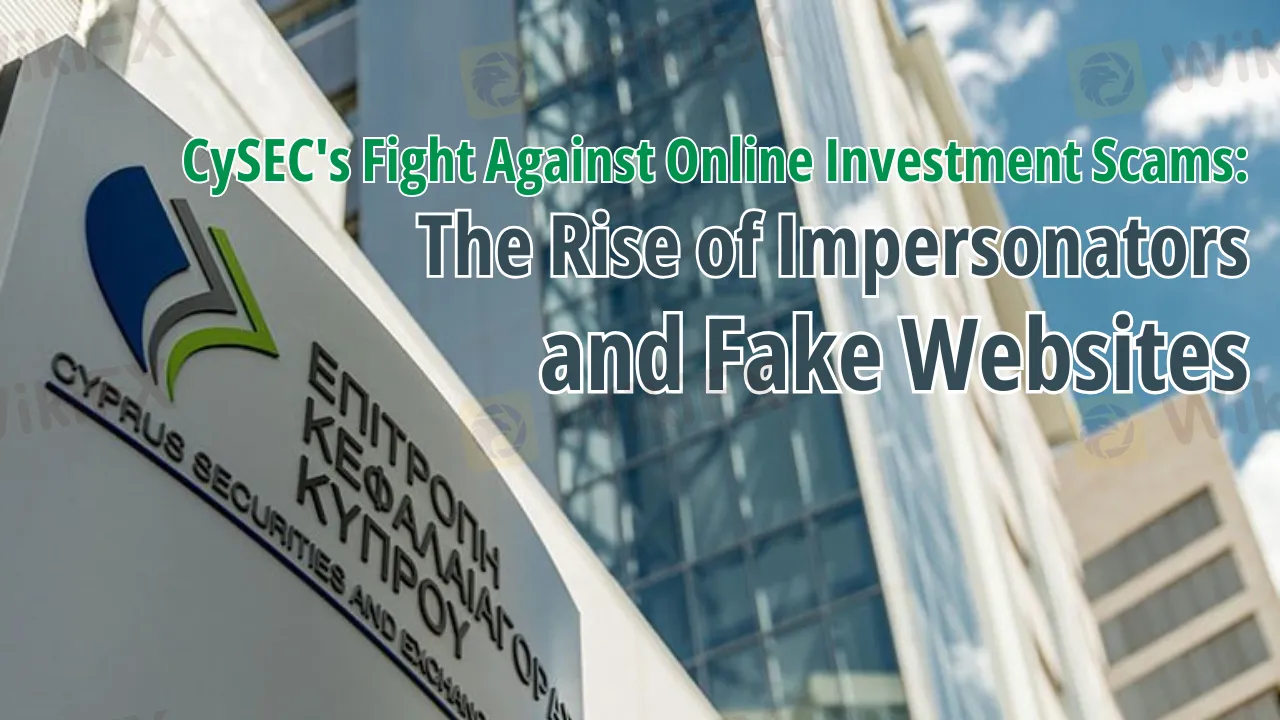简体中文
繁體中文
English
Pусский
日本語
ภาษาไทย
Tiếng Việt
Bahasa Indonesia
Español
हिन्दी
Filippiiniläinen
Français
Deutsch
Português
Türkçe
한국어
العربية
CySEC's Fight Against Online Investment Scams: The Rise of Impersonators and Fake Websites
Abstract:CySEC's battle against investment scams sees a surge in impersonators and fake websites. Explore the depth of these scams and the role of social media in this revelation.

The digital age has presented us with countless opportunities, but with it, comes an equal measure of threats. A key issue that has gained prominence in recent times is the rise of investment scams through impersonation and fake websites. At the forefront of battling this menace is the Cyprus Securities and Exchange Commission (CySEC).
Understanding the Scam: Impersonators & Fake Domains
CySEC, in its recent announcements, warns investors about fraudsters who masquerade as CySEC officers, misleadingly promising to settle compensation claims related to firms the regulator supervises. For a fee, of course.
Additionally, the impersonation doesn't end with individuals. CySEC has detected fake websites designed to mimic its official domain. These websites, with URLs such as cysec-regulatory.com and www.cysecgov.com, expertly mirror CySECs official imagery and content.
Decoding the Impersonation Menace

It's important to understand the depth of the deceit. For instance, another sham website, Cysecs.group, not only replicates CySEC but also provides counterfeit lists of approved investment firms in Cyprus. Such websites invariably have links connected to unauthorized or downright fraudulent brokers.
CySEC has clearly stated that it never solicits individuals via phone or sends unsolicited correspondence. Moreover, it doesnt have the authority to collect any fees from investors. The public, thus, must be wary of unsolicited communications from individuals or entities claiming association with CySEC.
The Role of Social Media in Amplifying the Threat
As we delve deeper into the issue, the role of social media platforms in proliferating scams becomes evident. Platforms such as Telegram are increasingly being used by scammers to pose as financial institutions, often promising attractive trading signals.
While CySEC doesnt directly combat financial service scams on social media, it employs advanced tools to monitor such fraudulent activities. On spotting a fake website or illicit activity, they promptly alert the concerned law enforcement agencies.
Interestingly, a recent survey by CySEC highlighted the increasing dependency on social media for financial advice. A whopping 31% of participants admitted to trusting financial influencers for investment decisions, and another 22% said they were influenced by celebrity endorsements and online promotions.
Stay Vigilant, Stay Safe
In conclusion, while regulators like CySEC are doing their part, the onus falls upon us, the investors, to remain vigilant. As the digital world grows more intricate, staying educated and cautious is our best defense against falling prey to such scams.
For continuous updates on such crucial information, consider installing the WikiFX App, available for download here: https://www.wikifx.com/en/download.html.

Disclaimer:
The views in this article only represent the author's personal views, and do not constitute investment advice on this platform. This platform does not guarantee the accuracy, completeness and timeliness of the information in the article, and will not be liable for any loss caused by the use of or reliance on the information in the article.
Related broker
Read more

The Ultimate Guide to Automated Forex Trading in 2025
Modern markets are revolutionized by automated trading systems, which now execute 70-85% of all transactions. These advanced automated trading software solutions, commonly called trading robots or Expert Advisors (EAs), leverage algorithmic precision for automatic trading across forex, stocks, and commodities 24/7. By removing emotional interference and executing trades in microseconds, auto forex trading platforms create fair opportunities for all market participants. For those new to automated trading for beginners, these systems provide disciplined, backtested strategies while significantly reducing manual effort.

Anti-Scam Groups Urge Tougher Action on Fraudsters in UK
Anti-scam groups demand tougher police action on fraudsters as UK fraud rates surge 19%, targeting millions in a penalty-free crime spree exposed by a $35m scam leak.

Will natural disasters have an impact on the forex market?
The forex market is known for its rapid responses to global events, but the influence of natural disasters, such as earthquakes and typhoons, can be less straightforward. While headlines may scream about catastrophic damage and economic disruption, the long-term effects on currency values often depend on a blend of immediate shock and underlying economic fundamentals.

Philippines Deports 29 Indonesians Linked to Online Scam Syndicate in Manila
Online scam groups in the Philippines trick Filipinos into gambling and love scams, from Manila to Bacolod, causing trafficking and pain as police fight back.
WikiFX Broker
Latest News
How Crypto Trading Transforms FX and CFD Brokerage Industry
UK would not hesitate to retaliate against US tariffs - No 10 sources
FCA Warns Against 10 Unlicensed or Clone Firms
CySEC Warns Against 14 Unlicensed Investment Websites
Top Currency Pairs to Watch for Profit This Week - March 31, 2025
Will natural disasters have an impact on the forex market?
Philippines Deports 29 Indonesians Linked to Online Scam Syndicate in Manila
Navigating the Intersection of Forex Markets, AI Technology, and Fintech
Exposed: Deceptive World of Fake Trading Gurus – Don’t Get Fooled!
AI-Powered Strategies to Improve Profits in Forex Trading
Currency Calculator







